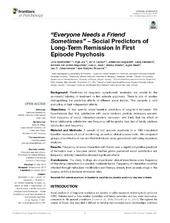| dc.contributor.author | Bjørnestad, Jone Ravndal | en_US |
| dc.contributor.author | Joa, Inge | en_US |
| dc.contributor.author | Larsen, Tor Ketil | en_US |
| dc.contributor.author | Langeveld, Johannes H. | en_US |
| dc.contributor.author | Davidson, Larry | en_US |
| dc.contributor.author | Hegelstad, Wenche | en_US |
| dc.contributor.author | Anda-Ågotnes, Liss Gøril | en_US |
| dc.contributor.author | Veseth, Marius | en_US |
| dc.contributor.author | Melle, Ingrid | en_US |
| dc.contributor.author | Johannessen, Jan Olav | en_US |
| dc.contributor.author | Brønnick, Kolbjørn Selvåg | en_US |
| dc.date.accessioned | 2017-06-09T11:27:50Z | |
| dc.date.available | 2017-06-09T11:27:50Z | |
| dc.date.issued | 2016-10-04 | |
| dc.Published | Bjørnestad JR, Joa I, Larsen TK, Langeveld JH, Davidson L, Hegelstad W, Anda-Ågotnes LG, Veseth M, Melle I, Johannessen JO, Brønnick KS. "Everyone Needs a Friend Sometimes" - social predictors of long-term remission in first episode psychosis. Frontiers in Psychology. 2016;7:1491 | eng |
| dc.identifier.issn | 1664-1078 | |
| dc.identifier.uri | https://hdl.handle.net/1956/15951 | |
| dc.description.abstract | Background: Predictors of long-term symptomatic remission are crucial to the successful tailoring of treatment in first episode psychosis. There is lack of studies distinguishing the predictive effects of different social factors. This prevents a valid evaluating of their independent effects. Objectives: To test specific social baseline predictors of long-term remission. We hypothesized that first, satisfaction with social relations predicts remission; second, that frequency of social interaction predicts remission; and third, that the effect of friend relationship satisfaction and frequency will be greater than that of family relations satisfaction and frequency. Material and Methods: A sample of first episode psychosis (n = 186) completed baseline measures of social functioning, as well as clinical assessments. We compared groups of remitted and non-remitted individuals using generalized estimating equations analyses. Results: Frequency of social interaction with friends was a significant positive predictor of remission over a two-year period. Neither global perceived social satisfaction nor frequency of family interaction showed significant effects. Conclusions: The study findings are of particular clinical importance since frequency of friendship interaction is a possibly malleable factor. Frequency of interaction could be affected through behavioral modification and therapy already from an early stage in the course, and thus increase remission rates. | en_US |
| dc.language.iso | eng | eng |
| dc.publisher | Frontiers | eng |
| dc.rights | Attribution CC BY | eng |
| dc.rights.uri | http://creativecommons.org/licenses/by/4.0 | eng |
| dc.subject | first-episode psychosis | eng |
| dc.subject | Schizophrenia | eng |
| dc.subject | social factors | eng |
| dc.subject | baseline predictors | eng |
| dc.subject | long-term remission | eng |
| dc.title | "Everyone Needs a Friend Sometimes" - social predictors of long-term remission in first episode psychosis | en_US |
| dc.type | Peer reviewed | |
| dc.type | Journal article | |
| dc.date.updated | 2017-05-15T10:06:45Z | |
| dc.description.version | publishedVersion | en_US |
| dc.rights.holder | Copyright 2016 The Author(s) | |
| dc.identifier.doi | https://doi.org/10.3389/fpsyg.2016.01491 | |
| dc.identifier.cristin | 1414092 | |
| dc.source.journal | Frontiers in Psychology | |

